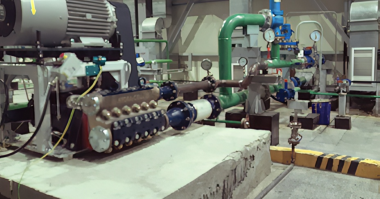Coking is a refinery unit operation that upgrades material called bottoms from the atmospheric or vacuum distillation column into higher-value products and, as the name implies, produces petroleum coke, a coal-like material.
Two types of coking processes exist—delayed coking and fluid coking. Both are physical processes that occur at pressures slightly higher than atmospheric and at temperatures greater than 900oF/485oC that thermally crack the feedstock into products such as naphtha and distillate, leaving behind petroleum coke.
With delayed coking, two or more large reactors, called coke drums, are used to hold, or delay, the heated feedstock while the cracking takes place. Coke is deposited in the coke drum as a solid. This solid coke builds up in the coke drum and is removed by hydraulically cutting the coke using water. In order to facilitate the removal of the coke, the hot feed is diverted from one coke drum to another, alternating the drums between coke removal and the cracking part of the process. With fluid coking, the feed is charged to a heated reactor, the cracking takes place, and the formed coke is transferred to a heater as a fluidized solid where some of it is burned to provide the heat necessary for the cracking process. The remaining coke is collected to be sold.
Operations in any refinery’s delayed coking unit are extremely severe, perhaps the harshest of any refinery operation due to high temperature/s.. As the operating drum fills with coke, torques on the valves trim tend to increase, putting additional stress on the transfer line ball valves and similarly added torque on the electric actuator. During the coke removal process, there is lots of vibration. The pressure water lines used to drill out and cut the coke from the drum internals create pressure in excess of 4000psi. The steam and quench water is susceptible to rapid expansion and temperature fluctuations of condensate and water producing an often water hammer. Further due to corrosion in traces of sulfur combine with unit’s wash down water, significant amount of abrasive airborne dust is created, covering all surfaces within the drum and and its immediate surrounds. The coke dust not only creates challenges for corrosion but builds up in crevices, impeding functionality; harsh conditions, hot and potentially dangerous and such areas require higher exotic alloys to deal with.
Depending upon the coking capacity, each drum in the coking process require 10-12valves for recirculation, switching, quenching, stripping, washing, reheating steam etc. These severe and harsh conditions of the coker operation often have a detrimental effect on these valves and the actuators operating them. Further making it more critical is the fact that the valves must work on a schedule of sequential strokes to divert in a precisely timed event.
Valves sequential event is controlled by an actuator which should be reliable. Valve and actuator both must have safe interlocks restricting their opening and closing through limit switches to maintain process control. An inoperable valve actuator must be reinstated quickly so that the system can continue functioning. If actuator fail, the valve should be capable to open manually (normally such operation is strenuous and time consuming, hence not a preferred option)
With such application while valves can be switched out for maintenance the actuators while in operation need to be reliable as well as mean time between failure can be costly affair on such demanding application.
The valve failure to be attributed due to water hammer, vibrations, broken internals, dislodge components of actuation, disconnection of motors, penetration of coke dust in critical areas, clogging eroding etc.
Installation of a robust valve and actuator solution to provide extended service life results in critical severe service valve selection and installation in exceptional and demanding service such as coking.
In Summary:
The importance of Coker valves cannot be understated, this is a batch process and Coker can become potential bottleneck in a continuous refining operation. If the critical coke drum filling, switching and decoking schedule gets interrupted, it could impact the entire refinery production, it could impact the entire refinery throughput, costing a user millions of dollars/day in lost production. The valve actuator, seemingly a very small item in the total process, has a significant importance and a great impact on the delayed coking operation. Premature failure can lead to extra costs for operator overtime, additional manpower for manual valve operation, replacement costs and potential refinery downtime, not to mention the safety aspects of manual operation. A robust solution is a metal seated ball valve with tungsten carbide or tougher material overlay with actuation of field-proven ductile iron-housed, powder-coated, compact size, unique internal electric circuitry configuration and modified hard wire operation which could provide considerable cost savings to potential shutdowns of this critical operation unit in a refinery.





Comments